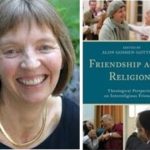Rationalities, Communities and Wisdom

Building a Spiritual Community
Elijah’s Executive Director, Alon Goshen-Gottstein, and the Director of Educational Activities, Peta Jones Pellach, together with Elijah Academy member, Therese Andrevon Gottstein, have been working with a small group of peace-makers from Jerusalem, Israeli and Palestinian, for the past two years in order to explore the possibilities of creating a spiritual community that will implement values of compassion and selflessness, guided by love towards each other, to the Holy City (Jerusalem/ Al-Quds), and to the world. The town of Kalamazoo, despite its somewhat humorous name, is a town that exemplifies social responsibility and concern for the greater whole and is the home of the Fetzer Institute, which has facilitated our gatherings. Recently, the group spent three intensive days at the retreat centre of the Fetzer Institute there. Fetzer’s work is guided by the words of its founder, a deeply spiritual man, John E Fetzer: “Love is the core energy that rules everything … love is the one ingredient that holds us all together.”

The grounds of the Fetzer Retreat centre (Peta Jones Pellach, July 2016)
The Fetzer Institute, which has partnered Elijah in the past (click here to see the videos on Forgiveness created with a grant from Fetzer) describes its work as helping build the spiritual foundation for a loving world. The stated goal is to help catalyze and support a broad-scale, spiritually grounded transformation from an ego-centered way of being grounded in separation and fear to an all-centered way of being grounded in oneness and love. Their vision is to mobilize a critical mass of people around the world embracing love as the guiding principle and animating force for living in sacred relationship with self, others, and the natural world.
For anyone who observes the world today, we know that Jerusalem is in great need of more love and less hatred, more generosity and less ego, more trust and less fear. For those of us who take the words of the Biblical prophets seriously, peace and love must come out of Jerusalem. Until we “heal” Jerusalem, the beautiful vision of Fetzer will not be realized.
Elijah’s vision of creating a Center of HOPE, the House of Prayer and Education, in Jerusalem is consistent with Fetzer’s desire to create a more loving Jerusalem. The Centre will be an interfaith haven in a city where religion is often used to divide rather than to bind people together. It will offer prayer-spaces for six different religious traditions and places for people to learn with and about each other. The Praying Together in Jerusalem initiative is another of Elijah’s projects designed to foster a more harmonious society. Until HOPE is built, we will continue to undertake HOPE activities. Other members of the group have been entrepreneurs in peace-work, social welfare and dialogue and activists in creating a more spiritual Jerusalem.

Inspiring ideas (Peta Jones Pellach, July 2016)
In order to solidify this “spiritual community,” it was wisely decided that it would be beneficial for this group to be away from daily life and away from the place that both inspires and frustrates us. At our time at Fetzer, we learnt about ourselves, each other and Jerusalem and contemplated how we might make a difference, in an idyllic setting that left no doubt that we were away from the tensions of the Holy City for which we have so much hope.
Click here for a report on the activities at the retreat.
Dialogue of Rationalities
The Institut Catholique de Paris held a large conference at the end of June on “Dialogue of Rationalities“. The conference sought to examine how we are able to dialogue with each other despite gaps of worldviews and different ways of seeing the world, different “rationalities”.
Elijah director, Rabbi Alon Goshen-Gottstein, was invited to deliver a keynote in which he reflects on how we can share across religions, drawing on 20 years of work at Elijah and in view of the HOPE project (link) that Elijah seeks to launch in Jerusalem. In this lecture, among other things, he appeals to a notion developed by St. John Paul II, who justified the Assissi interreligious gathering by appeal to the presence of the Holy Spirit in other religions. While acknowledging the difference of what “Holy Spirit” means for Jews and Christians, Goshen-Gottstein expresses his intrigue with the concept and seeks to construct a parallel Jewish understanding, by means of which interreligious learning may be shared, especially in contexts of prayer. This he does by appeal to a teaching of Rabbi Abraham Isaac Kook who considers the founders of all religions to have been inspired by the Holy Spirit, which therefore makes the presence of the Holy Spirit available through all religions. Click here to watch his presentation at the following Youtube clip.
* Note: the talk is delivered in French.
Summer Leadership Institute
If you are in Jerusalem, please join us for the summer leadership institute, beginning on Sunday 31st July. There, you will experience elements of both a spiritual community and the dialogue of rationalities. It is possible to join us for just one day or even for individual sessions. The program and registration options can be found on the website.
Sharing Wisdom
The convener of the Jerusalem group working with Fetzer is Maria Reis Habito, a member of the Elijah Academy and the representative of Dharma Master Tao on the Elijah Board of World Religious Leaders. Together with Rubern Habito, Maria wrote the Chapter on Buddhist views on Interreligious Friendship for the volume published last year. Here is an extract from her writing, which relates to the values experienced at the Fetzer retreat, where we were building a spiritual community, based on our ability to develop deep friendship and reliance on one another to achieve our ultimate goals together – a shared spiritual aspiration.

Maria Reis Habito and “Friendship Across Religions”
Metta or loving kindness is one of the “Four Sublime Attitudes,” the states of mind or attitudes taught by the Buddha as conducive to as well as issuing from enlightenment. The other three are compassion (karunā), equanimity (uppekhā) and joy (muditā) at the fortune of others. A true spiritual friend is one who manifests these spiritual states or attitudes. Kalyāņa has various translations, such as “beautiful, charming, auspicious, helpful, good.” It can also be rendered as “noble” or “lovely” in Buddhist scriptures. The dharma or Buddhist teaching itself is described in several passages as “kalyāņa in the beginning, kalyāņa in its middle and kalyāņa in its end.”
As Subhuti (2004) writes, “a friendship that is kalyāņa therefore is lovely, not just because it is pleasant or warm, but because it is based on a shared orientation to what is ultimately beautiful: the transcendental reality known to the enlightened mind.” The expression “spiritual friendship” distinguishes it from all other sorts of friendships by highlighting the basis and essence of this friendship as a shared spiritual aspiration, path and experience….
[the Buddha explains]“By the following method too, Ānanda, it may be understood how the entire holy life is good friendship, good companionship, good comradeship: by relying upon me as a good friend, Ānanda, beings subject to birth and death are freed from death; beings subject to sorrow, lamentation, pain, displeasure, and despair are freed from sorrow, lamentation, pain, displeasure, and despair. By this method, Ānanda, it may be understood how the entire holy life is good friendship, good companionship, good comradeship.”
